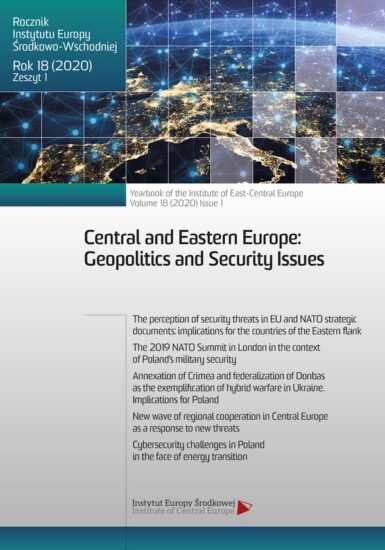Strategiczna interakcja. Rząd PRL, Solidarność, Kościół i problem więźniów politycznych
ORCID: Andrzej Friszke: 0000-0001-8793-6079
Afiliacja: Polish Academy of Sciences, Poland
Strony: 201-225
Wydanie: Lublin 2020
DOI: https://doi.org/10.36874/RIESW.2020.1.11
Sposób cytowania: A. Friszke, Strategic interaction: The PRL Government, Solidarity, the Church, and the problem of political prisoners, „Rocznik Instytutu Europy Środkowo-Wschodniej” 18(2020), z. 1, s. 201-225, DOI: https://doi.org/10.36874/RIESW.2020.1.11
Słowa kluczowe: kościół, mechanizm władzy, Solidarność, stan wojenny, więźniowie polityczni
Abstrakt: This study of the struggle between the government of the Polish People’s Republic and Solidarity in the years 1981-1984 discerns three key actors in Polish politics: the Communist party leadership and security apparatus, the arrested leaders of Solidarity, and the bishops and advisers of the Catholic Church. The PRL government made strategic decisions in this period regarding repression and liberalization. Following initial advanced preparation for the trial of eleven arrested leaders of Solidarity and KSS KOR, the government attempted to coerce the arrestees into leaving Poland, thus weakening the movement’s legitimacy. The article demonstrates how the interaction between the leaders of the two sides – mediated by bishops and advisers – produced a new dynamic and a shift in the existing political mechanism. What was once a mass movement transformed into a more regular, staffed organization with a greater role played by leaders, who symbolized the continuity of the movement and enabled Solidarity to weather the period of repression. The article shows the changes and tensions in the Solidarity movement, along with the changes that were occurring in parallel on the side of the government and the mediating third actor, i.e., the Catholic Church. This case study of the strategic clash that occurred at the beginning of the 1980s illustrates the transformations that took place within the government and Solidarity – transformations that would prove crucial to the transition process in 1988-1989.
Bibliografia:
Afera „Żelazo” w dokumentach MSW i PZPR, eds. W. Bagieński, P. Gontarczyk, Warszawa: Wydawnictwo Instytutu Pamięci Narodowej, 2013.
Friszke, A., ‘Internowani, aresztowani, skazani. Pozbawieni wolności w okresie stanu wojennego 1981-1983/4’, Kwartalnik Historyczny, no. 2, 2017, https://doi.org/10.12775/kh.2017.124.2.03.
Friszke, A., PRL wobec Kościoła: akta Urzędu do spraw Wyznań 1970-1978, Warszawa: Instytut Studiów Politycznych PAN, 2010.
Friszke, A., Rewolucja Solidarności 1980-1981, Kraków: Znak, 2014.
Friszke, A., ‘Siedem lat przed okrągłym stołem. Prymasowska Rada Społeczna w stanie wojennym’, in: Przystosowanie i opór. Studia z dziejów PRL, Warszawa: Więź, 2007.
Friszke, A., Tymczasowa Komisja Koordynacyjna NSZZ „Solidarność” (1982-1987), in: Solidarność podziemna 1981-1989, ed. A. Friszke, Warszawa: ISP PAN, 2006.
Gasztołd, P., Towarzysze z betonu. Dogmatyzm w PZPR 1980-1990, Warszawa: Wydawnictwo Instytutu Pamięci Narodowej, 2019.
Jan Paweł II, Prymas i Episkopat Polski o stanie wojennym. Kazania, listy, przemówienia i komunikaty, ed. P. Raina, London: Oficyna Poetów i Malarzy, 1982.
Łatka, R., ‘Rada Główna Episkopatu Polski wobec opozycji przedsierpniowej (1976-1981)’, Pamięć i Sprawiedliwość, vol. 29, no. 1, 2017.
Moskwa, J., Droga Karola Wojtyły, vol. II: Zwiastun wyzwolenia 1978-1989, Warszawa: Świat Książki, 2011.
Olaszek, J., Podziemne dziennikarstwo. Funkcjonowanie głównych pism informacyjnych podziemnej „Solidarności” w Warszawie w latach 1981-1989, Warszawa: Wydawnictwo Instytutu Pamięci Narodowej, 2018.
Orszulik, A., Czas przełomu. Notatki z rozmów z władzami PRL w latach 1981-1989, Warszawa-Ząbki: Apostolicum, 2006.
Paczkowski, A., Droga do «mniejszego zła». Strategia i taktyka obozu władzy, lipiec 1980 – styczeń 1982, Kraków: Uniwersytet Pedagogiczny, 2002.
Paczkowski, A., Wojna polsko-jaruzelska. Stan wojenny w Polsce 13 XII 1981 – 22 VII 1983, Warszawa: Prószyński Media, 2006.
Raina, P., Arcybiskup Dąbrowski – rozmowy watykańskie, Warszawa: IW PAX, 2001.
Raina, P., Stan wojenny w zapiskach arcybiskupa Dąbrowskiego, Warszawa: Wydawnictwo Von Boroviecky, 2006.
Raina, P., Troska o internowanych. Interwencje abp. Dąbrowskiego u gen. Kiszczaka 1982-1989, Warszawa: Wydawnictwo Von Boroviecky, 1999.
Raina, P., Wizyty Apostolskie Jana Pawła II w Polsce, Warszawa: Książka Polska, 1997.
Rakowski, M.F., Dzienniki polityczne 1981-1983, Warszawa: Iskry, 2004.
Ramotowski, J.P., Sto razy głową w mur. Historia tych, co chcieli robić coś innego niż druk bibuły, Warszawa: Wydawnictwo Instytutu Pamięci Narodowej, 2013.
Rodowicz, W., Komitet na Piwnej. Fakty – dokumenty – wspomnienia, Warszawa: Biblioteka „Więzi”, 1994.
Siwek, S., Prymasowska Rada Społeczna ks. kard. Józefa Glempa, Prymasa Polski. Przebieg prac, dokumenty z lat 1981-1990, Warszawa-Ząbki: Apostolicum, 2016.
Tajne dokumenty. Państwo – Kościół 1980-1989, London: Aneks, 1993.
Słowa kluczowe: kościół, mechanizm władzy, Solidarność, stan wojenny, więźniowie polityczni
PDF: Pobierz